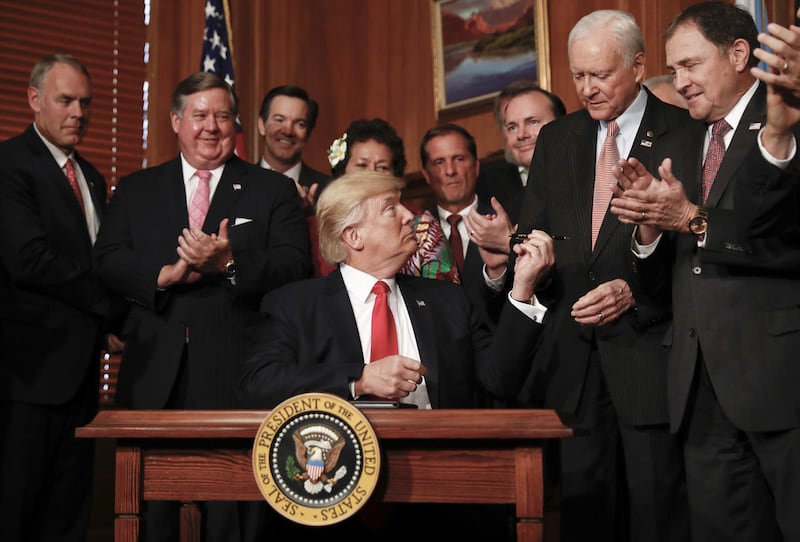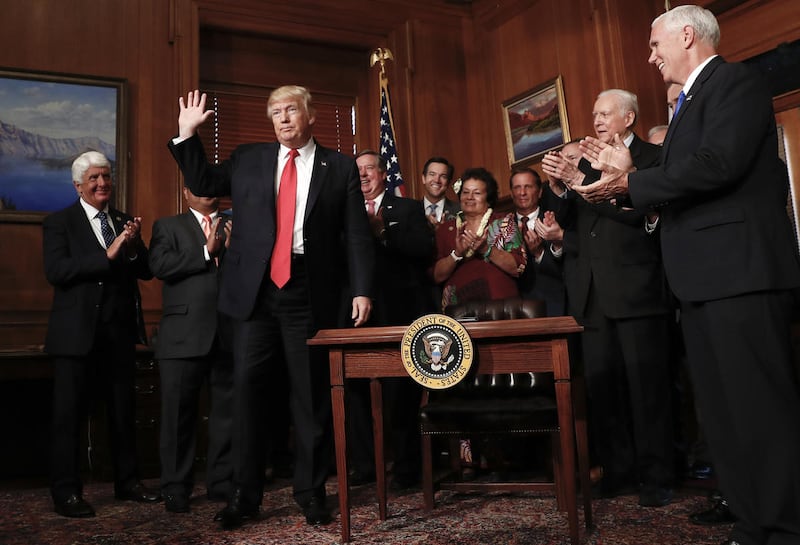WASHINGTON — Five days after the inauguration of President Donald Trump, Sen. Orrin Hatch, R-Utah, was summoned to the Oval Office.
Hatch and Trump had been talking for weeks on the phone about the Supreme Court and who Trump should nominate. Driving around Salt Lake City, Hatch’s phone would suddenly ring, a staffer says, and it would be the president.
The two had become unlikely friends and allies. Trump ran an anti-Washington campaign, and after he was elected he promised to “drain the swamp,” ridding D.C. of career bureaucrats and the elite political establishment.
Few in Washington typify the establishment more than Hatch, a member of the Senate for nearly 42 years, and yet Trump had found he could count on the 83-year-old — more than that, he needed him. During the Republican National Convention in July, when it looked like the Utah delegation might revolt in a moonshot bid to stop Trump’s nomination, Republican power brokers had leaned on Hatch and his chief of staff to quell the rebellion and bring Utah back into the fold. It had worked.
In the time since, Hatch had proved to be a reliable sounding board on nominees to the president’s Cabinet. And as chairman of the Senate Finance Committee, Hatch is one of the most powerful people in Washington, and the president will need his support on anything affecting the budget, from tax reform to infrastructure. Now, five days in, the president wanted to meet with Hatch for their first face-to-face since the inauguration.
After about 30 minutes discussing the Supreme Court (Hatch staffers say he pitched eventual nominee and now-Justice Neil Gorsuch), Hatch brought up something not on the agenda: Bears Ears.
It wasn’t clear to Hatch if Trump even knew what that meant, or how, in the final weeks of his presidency, President Barack Obama had used something called the Antiquities Act to declare 1.35 million acres of red rock canyons and juniper-studded bluffs in southern Utah a national monument. The designation, one in what Hatch saw as a long history of federal land grabs throughout the West, would greatly restrict the way cattle ranchers, Native Americans and others in San Juan and surrounding counties could use the land, possibly cutting them off from grazing rights, coal extraction or simply gathering firewood.

President Donald Trump acknowledge applause after signing an Antiquities Executive Order during a ceremony at the Interior Department in Washington, Wednesday, April, 26, 2017. Th president is asking for a review of the designation of tens of millions of acres of land as "national monuments." Front row, from left are, Rep. Ben Bishop, R-Utah, the president and Sen. Orrin Hatch, R-Utah.| AP Photo/Carolyn Kaster
Hatch said he was sick of his home state “getting picked on.”
According to Hatch, they spoke for 20 to 30 minutes about Bears Ears. Trump was intrigued. The Bears Ears National Monument covered a swath of land four times the size of Los Angeles.
“It sounds like the largest real estate deal I could ever be involved in,” Trump said, according to one source with knowledge of the conversation.
Hatch left the meeting with a pledge from the president that he would return the land to state control if possible. Over the next several months, the Utah delegation kept up the pressure to rescind the national monument designation. Internally, the White House started referring to the effort as the “Hatch E.O.” (executive order).
Last week, on April 26, Trump made good on his promise to Hatch. Nearing his first 100 days in office, a historic benchmark by which modern presidents have been measured, Trump arrived at the office of the Interior Department to announce an executive order that would require Secretary Ryan Zinke to review the size and scope of national monuments larger than 100,000 acres created since 1996. This would not only include Bears Ears but also the Grand Staircase-Escalante monument created under then-President Bill Clinton.
“It’s time to end these abuses and return control to the people, the people of Utah,” Trump said, standing at a lectern in Zinke’s office, which Zinke had decorated with heads of buffalo and antelope mounted on the wall. Several members of the Utah congressional delegation stood beside Trump, along with Gov. Gary Herbert, who’d flown in for the ceremony.
“I also want to recognize Senator Orrin Hatch,” Trump said. “Who, believe me, he’s tough. He would call me and say, ‘You gotta do this.’ Is that right Orrin?”
Trump turned from the lectern and grinned at Hatch.
“He doesn’t stop. He doesn’t give up. And he’s shocked I’m doing it, but I’m doing it because it’s the right thing.”
Trump sat down to sign the order, flanked by Herbert, Hatch, and Utah Sen. Mike Lee. He uncapped his pen with a flourish.
“This is a big one,” he said.
“Sure is,” said Hatch.
Trump paused, turning to Hatch and tapping him with the pen.
“Think I might have to give him the pen?” he said, swiveling in his chair to look up at Lee. “What do you think?”
“I would treasure it,” Hatch said. “I’ll tell you that.”
Trump turned back to the executive order, laid out before him. The sound of the pen scratching across the paper filled the room.
“That’s a great signature,” someone said.
When Trump was done, he turned to Hatch and handed him the pen.
“It’s my honor,” Trump said.
Hatch bent down to accept the pen from a seated Trump, holding it carefully in his hands in a motion that looked like a bow.
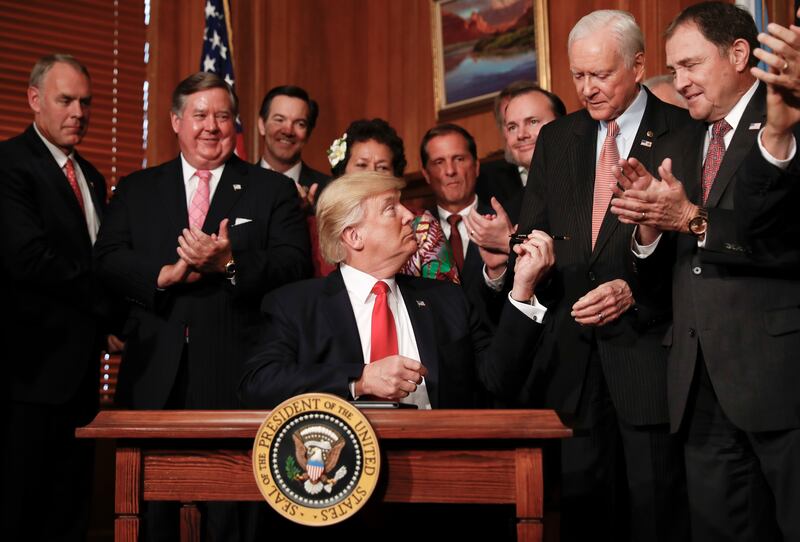
President Donald Trump hands a pen to Sen. Orrin Hatch, R-Utah after signing an Antiquities Executive Order during a ceremony at the Interior Department in Washington, Wednesday, April, 26, 2017. The president is asking for a review of the designation of tens of millions of acres of land as "national monuments." | Carolyn Kaster, Associated Press
It was a moment heavy with meaning, Hatch would later say, the culmination of months of behind-the-scenes work by the entire Utah delegation that had resulted in what Republicans in Utah saw as one of their most significant victories in recent memory on public lands.
But it hardly represents the end of the battle over Bears Ears. In fact, with Interior Secretary Zinke arriving in Utah this weekend to review the monument, it may only be the beginning of a tale three years in the making.
Power brokers
A week later, Hatch was in the office he uses a few times a week as president pro tem, a title that means he’s third in line for the presidency.
Trailed by two aides, Hatch took a seat beneath an ornate crystal chandelier to explain how the Bears Ears executive order had come to be and what role he played behind the scenes in getting it on the president’s desk. This and other interviews with members of Utah’s congressional delegation, aides and White House staff paint a picture of how things get done in the Trump administration, including the powerful, and perhaps unprecedented, role Utah is playing in shaping legislation.
Hatch says that while he’s had access to “all the presidents,” his access to Trump is unlike anything since Reagan, who Hatch says treated him like “a long lost son.” While he is sometimes blasted for his long tenure in Washington, Hatch makes no apologies for the power and influence he has come to wield. In fact, in recent elections it has become his most compelling selling point, and in the case of Bears Ears, insiders say it’s probably the biggest reason Trump made an otherwise obscure public lands issue a top priority worthy of addressing in Trump's first 100 days.
Or perhaps, as another Washington insider says, Trump was simply scrambling to find something he could point to as an accomplishment in what the New York Times has declared the most ineffectual 100 days in modern political history, with no significant legislation passed.
When asked if he was the reason Trump signed the executive order, Hatch didn’t hesitate.
“No question,” he said. “… I don’t want to take credit for it. I think I deserve credit for it, but I don’t want to offend the rest of the delegation.”
In an interview in his Washington office this week, Lee said it was the unified delegation’s work that resulted in the executive order and that he had spoken to “the White House, people in the White House and Secretary Zinke” more times than he could count, along with Vice President Mike Pence. “I’m not sure I can even outline everything I’ve done on it.”
Rep. Rob Bishop, R-Utah, the chairman of the House Natural Resources Committee, has spent hundreds of hours in meetings about public lands and has been perhaps the most vociferous critic of the Bears Ears designation. Behind the scenes, Bishop said he lobbied the White House relentlessly for months after Trump’s election to figure out a way to undo the designation, which he has called “the most evil act ever invented.” He also pushed a bill that, had it passed the Senate, would have stripped Obama or any future president from using executive orders to create monuments. And when Rep. Jason Chaffetz met with Trump in January for 35 minutes, the Utah Republican also pressed the president on Bears Ears.
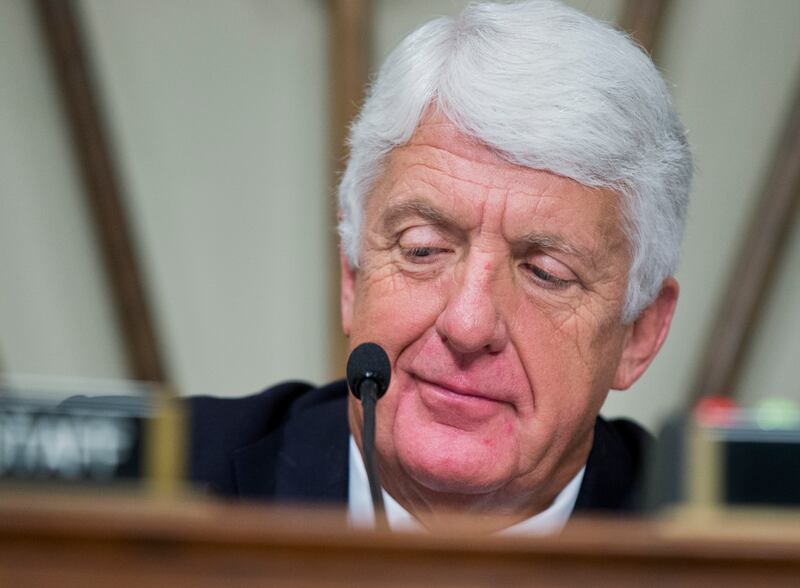
House Natural Resources Committee Chairman Rep. Rob Bishop, R-Utah, presides over an oversight hearing about the U.S. Department of the Treasury's analysis of the situation in Puerto Rico, on Capitol Hill in Washington, Thursday, Feb. 25, 2016. | AP Photo/Manuel Balce Ceneta
Hatch acknowledges all of this, and he says Trump also thought reviewing the designation was “the right thing to do,” but also says there’s no doubt politics was involved.
“All I can say is I was the only one (of the delegation) who supported Trump,” Hatch said. “… I was pretty sure he was going to hand me the pen. The thing was set up by me and requested by me. It’s very symbolic because it’s his way of showing I’ve done what you believe is right, and what I believe is right, and I want you to have the pen that made the scratches on the paper.”
Hatch’s relationship with Trump began last May when the then-candidate called and asked for his support.
“He said, ‘Senator, I want you to support me. I said, ‘You don’t want me. I’m the kiss of death.’”
He’d supported former Florida Gov. Jeb Bush and Florida Sen. Marco Rubio, and both had gone down in defeat, he said he explained to Trump.
But Trump insisted. “I’ve been with him ever since," Hatch said.
Hatch’s unwavering support of Trump was difficult for staffers during portions of the campaign, one aide said, particularly when the “Access Hollywood” tape surfaced in which Trump was caught on camera making lewd and vulgar comments about women. One staffer says Hatch was approached and asked if they should keep backing the candidate, worried the comments crossed a line for many Utah voters, but Hatch stayed committed, primarily because he believed Trump was the surest bet to deliver a conservative Supreme Court justice, which proved prescient with Gorsuch.
“That’s all years before,” Hatch says of the “Access Hollywood” tape. “Look, I happen to be a Mormon by religion. Our religion believes people can repent, they can change their lives, which apparently he’s changed his life. I don’t even know if that was true or if it was just locker room talk as he said it was. But that was 11 years before, and I’m not going to judge him by mistakes he made a decade before or more. And I’m sure he realizes that was a mistake.”
“So I judge him by what he is today, and all I can say is he’s a very strong personality with a lot of intellectual fortitude.”
Since Trump was elected, Hatch has met with him on average about once a week, a staffer says. Sometimes they meet more often, and some weeks pass without meeting at all.
When it comes to Bears Ears, Hatch says Trump was sympathetic to his position about state’s rights and listening to the will of the people affected by decisions made in Washington. For Hatch, the designation was personal, and even today, he remains offended that Clinton declared Grand Staircase a national monument without consulting with him.
“It was pretty offensive to me, and frankly, we’ve had enough of that in Utah,” he said of the Grand Staircase designation. “… The people of Utah are very independent. They don’t like people coming in and telling them what to do, and they naturally bristle when the federal government says we’re going to do this whether you like it or not.”
What's next?
On Wednesday, a few miles from Hatch’s D.C. office, a coalition of tribal leaders held a news conference at the National Press Club to express their opposition to the executive order. Robert Holden, the deputy director of the National Congress of American Indians, said that so far the Trump administration has ignored requests to meet with them, and he demanded a meeting with Secretary Zinke.
Hatch, Lee and Bishop have maintained that the tribes who live in the area of the monument oppose it, and Hatch had visited Bears Ears weeks before, joining an impromptu march with Native Americans opposed to the monument. But the Bears Ears Inter-Tribal Coalition has pushed back on this opposition, pointing out that the borders federal and state governments use to figure out which land is used by which tribes are often meaningless to them.
Shaun Chapoose, chairman of the Ute Indian Tribe, suggested that those who say there is no support for the monument among Native Americans are being willfully dishonest. He was referring specifically to Bishop, who said at a congressional subcommittee hearing on Tuesday that he knew of no local Native Americans who supported the monument. “He’s a good storyteller,” Chapoose said.
John Ruple, associate professor of law at the Wallace Stegner Center for Land Resources and the Environment at the University of Utah, says its rare to have what he sees as essentially uniform agreement on an issue among tribes that historically have disagreed.
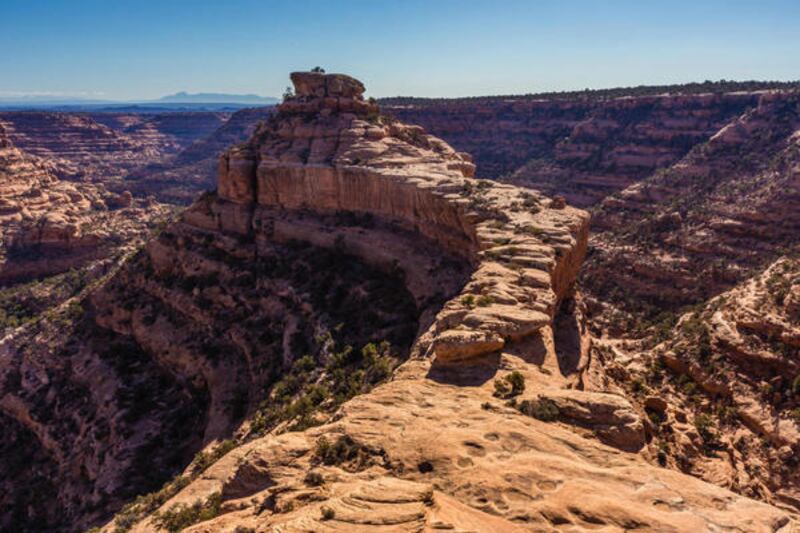
An Ancestral Puebloan ruin site within the boundaries of Bears Ears National Monument. | Dave Cawley, Deseret News
“They are coming together with one voice in support of this monument and that’s truly historic,” he says. “They’re locking arms around this issue.”
Ruple also points out that while there are discordant voices within the Native American community, it’s disingenuous to give the same weight to one member of a tribe who supports the monument as to the elected head of a tribal government.
“Simply because a person is Navajo does not mean they speak on behalf of the Navajo Nation,” Ruple says. “They have an elected government. That’s who speaks for the nation and that’s who we should be listening to.”
Ruple says Zinke’s visit to Utah beginning Sunday is just the first step in a review process that could go several ways. If Trump decides to undo the monument with the stroke of a pen, Ruple says the dispute will go to court, and based on historical precedent, the monument will stand.
While some who oppose the monument have suggested Obama’s designation represented a misuse of the Antiquities Act, the act has been used more than 150 times since it went into effect in 1906, by nearly every president, Republican or Democrat. Five of the most visited national parks — including the Grand Canyon, Zion and Grand Teton in Idaho — were first protected using the Antiquities Act.

Cottonwood Canyon in the Grand Staircase Escalante National Monument September 14, 2003. | Ravell Call, Deseret News
Obama’s decision to declare Bear’s Ears a national monument in the final days of his presidency also has a long historical precedent. Theodore Roosevelt used the Antiquities Act two days before he stepped down in 1909 to declare what is now part of the Olympic National Park in Washington a national monument. Herbert Hoover, Dwight D. Eisenhower and John F. Kennedy also used the Antiquities Act.
Only one president has tried to revoke a national monument since 1938, when President Franklin Roosevelt moved to undo a monument in South Carolina. But the attorney general at the time decided the Antiquities Act didn’t give the president power to rescind a monument.
And that’s why Ruple thinks it’s more likely Zinke will either recommend reducing the size of the Bear’s Ears or take the decision to Congress, which has overturned monument designations a dozen times (the last time was in 1980).
“No one is talking here about setting up commercial enterprises on the Bears Ears buttes,” says Lee. “No one is talking about a proposal that would result in this land being defiled. This is about who makes decisions that will have a profound impact on the local population.”
Back in his office as president pro tem, Hatch says he hopes the executive order will eventually lead to access to what he calls "environmentally sound coal" on what is now the Grand Staircase monument.
At the end of the day, it's not about what out-of-state environmentalists want, he says, but what locals want.
"I don't want my state picked on. I don't want those humble people in that county treated like crap, and that's the way they were being treated," Hatch said. "… The environmentalists in our society have had their own way all this time, and this one time they're not getting their way."
A few minutes later, a staffer reminded Hatch he had to leave soon for a meeting at the White House.
"I do?" he said. He then chuckled, seemingly pleased with how often he sees the president.
"I'm trying not to see him every time I turn around."

